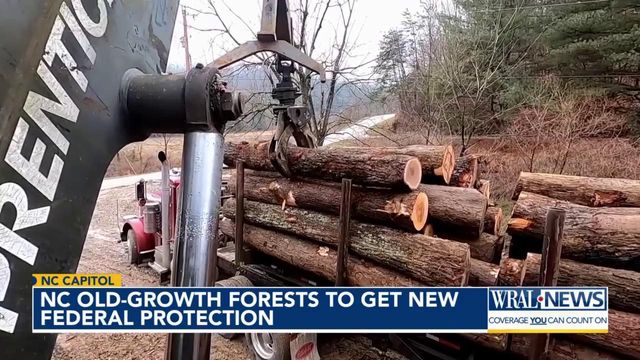New rule could mean more protection for NC's old-growth forests
Conservationists in North Carolina could be getting a big Christmas present from the federal government.
A nationwide policy change proposed this week by the U.S. Forest Service will mean more protection for old-growth stands in the Pisgah and Nantahala National Forests in western NC.
Unlike national parks, which are managed for conservation, national forests are managed by the U.S. Forest Service within the U.S. Department of Agriculture. The USDA tries to balance conservation and recreation with the logging needs of the timber industry.
In western North Carolina, the recently-enacted management plan governing the Nantahala and Pisgah national forests protects some old-growth areas from logging, but not all. Conservation groups and other critics battled the Forest Service over that plan for most of the past decade.
"There is a lot of actual existing old growth out there on the landscape, and it's in places where the Forest Service is emphasizing timber production," says Sam Evans, lead Forests attorney with the Southern Environmental Law Center. "So those are the areas that we're most worried about."
The rule change proposed by the Forest Service this week would require all national forest managers nationwide to manage old-growth forest to maintain its old-growth characteristics, and to protect it from commercial logging.
"That is a groundbreaking change," Evans said. "It's something that the Forest Service has never done before, and we're really excited about it."
Will Harlan is the southeastern director for the Center for Biological Diversity. He says the proposed rule is a promising start, but would still allow logging in old growth forests for "ecological reasons."
"The Forest Service has frequently been justifying their logging using ecological language, and they may continue to do so. So our concern is that this amendment will simply put a happy face on the status quo and allow the Forest Service to continue logging in old-growth forests," Harlan said. "But if we can sharpen the language and plug those loopholes, we think this Forest Plan amendment could get us really far."
Harlan says old growth forests store vast amounts of carbon, much more than younger forests do, and the proposed change officially recognizes that.
"Here in North Carolina, we have less than 1% of our forests that are in old growth condition," Harlan said. "They are the biodiversity hotspots. They are the source of our clean drinking water.
The US Forest Service is accepting public comments on the proposed rule through Feb. 7.
"This is the public's opportunity to tell the forest service that they want to see these old-growth forests completely protected for future generations," Harlan said.
The North Carolina Forestry Association didn't immediately respond to WRAL's request for comment, but national timber industry leaders have pushed back against the proposal.
The rule will undergo an administrative review process in 2024, and won't take effect until 2025. However, the Forest Service is requiring any logging projects in old-growth forests to undergo federal review, effective immediately.











